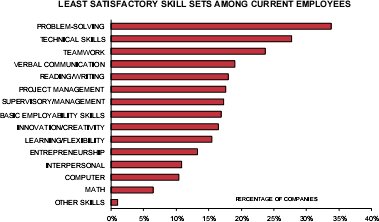
Some skills deficiencies do vary according to firm size. In general, there are fewer companies with ten employees or less, and fewer firms with over 500 employees, that report skills in need of improvement than companies with ten to 200 employees. There are two notable exceptions. More small and mid-sized firms than larger companies say that the technical skills of their employees are in need of improvement. And, deficiencies in project management capabilities are more apparent among the smallest and largest firms than in companies with ten to 200 employees.
The reasons that manufacturers give for rejecting job applications provides another way of assessing the basic skills required for employment in modern manufacturing. According to CME’s 2004 Management Issues Survey, approximately 25% of firms report that a lack of job openings is one of the three most common explanations for rejecting applications, and 21% say that other candidates for available positions have better qualifications. (See Tables 17, 18, and 19.) But, more specific, skills-related issues are important as well. Over 30% of manufacturers surveyed across Canada cite inadequate work experience, while 27% say that a lack of basic employability skills are important reasons for rejecting job applicants. Other common reasons include the lack of specific technical or management skills, poor references from previous employers, inability to work in teams, and poor oral communication skills.
A higher proportion of manufacturers in Western and Atlantic Canada report that the lack of experience and basic employment skills is a problem. Smaller companies rather than mid-sized or larger firms tend to reject job applications because of inadequate work experience and lack of basic employability skills. Mid-sized and larger companies, on the other hand, are more likely to reject applications on the grounds of insufficient technical or management skills and inability to work in teams.